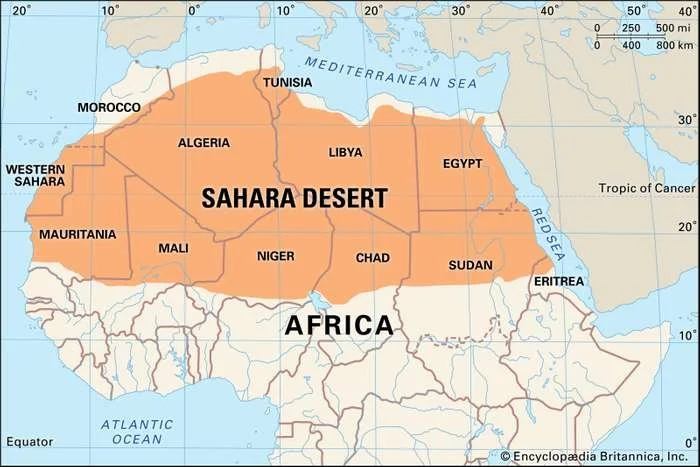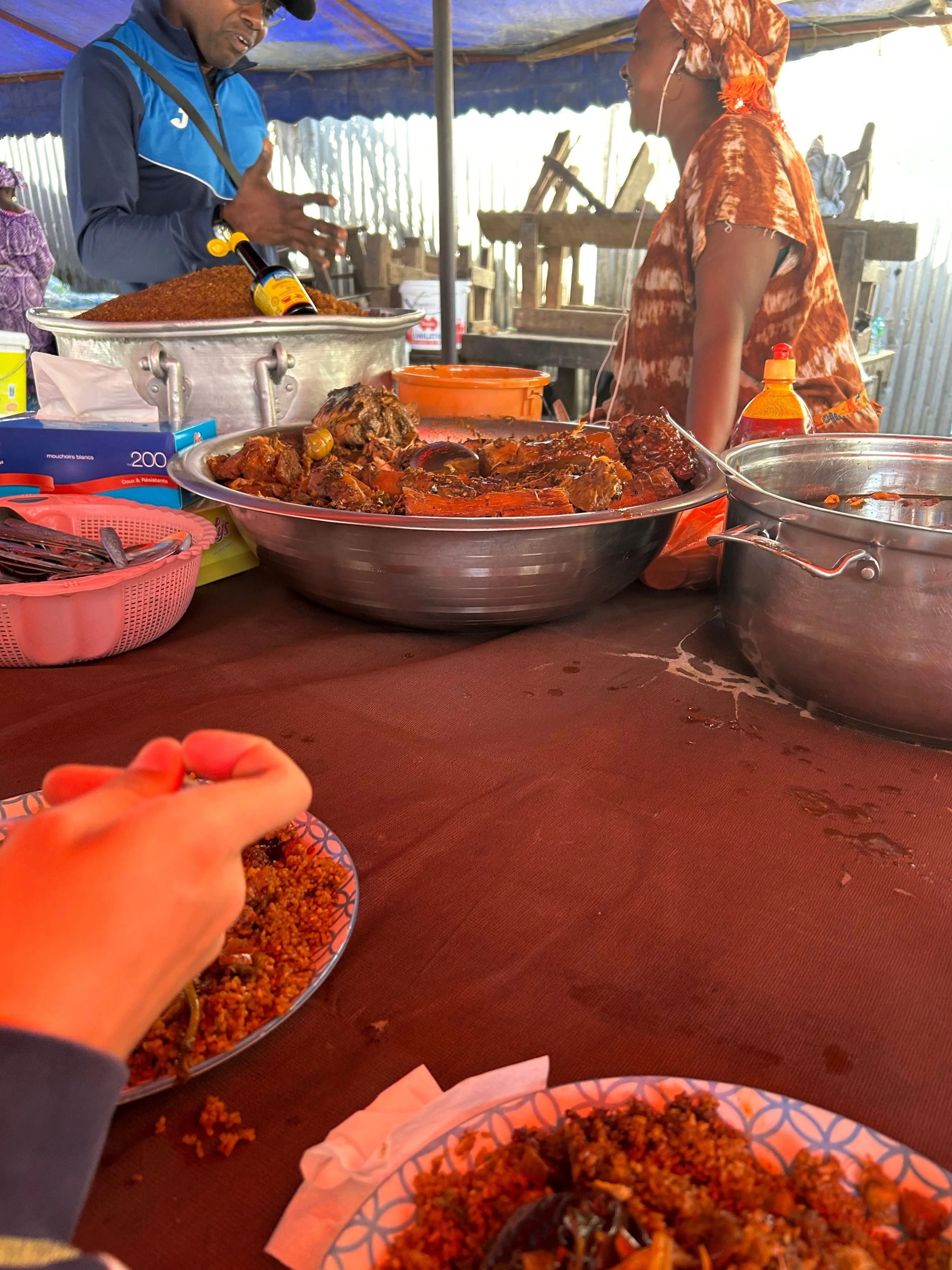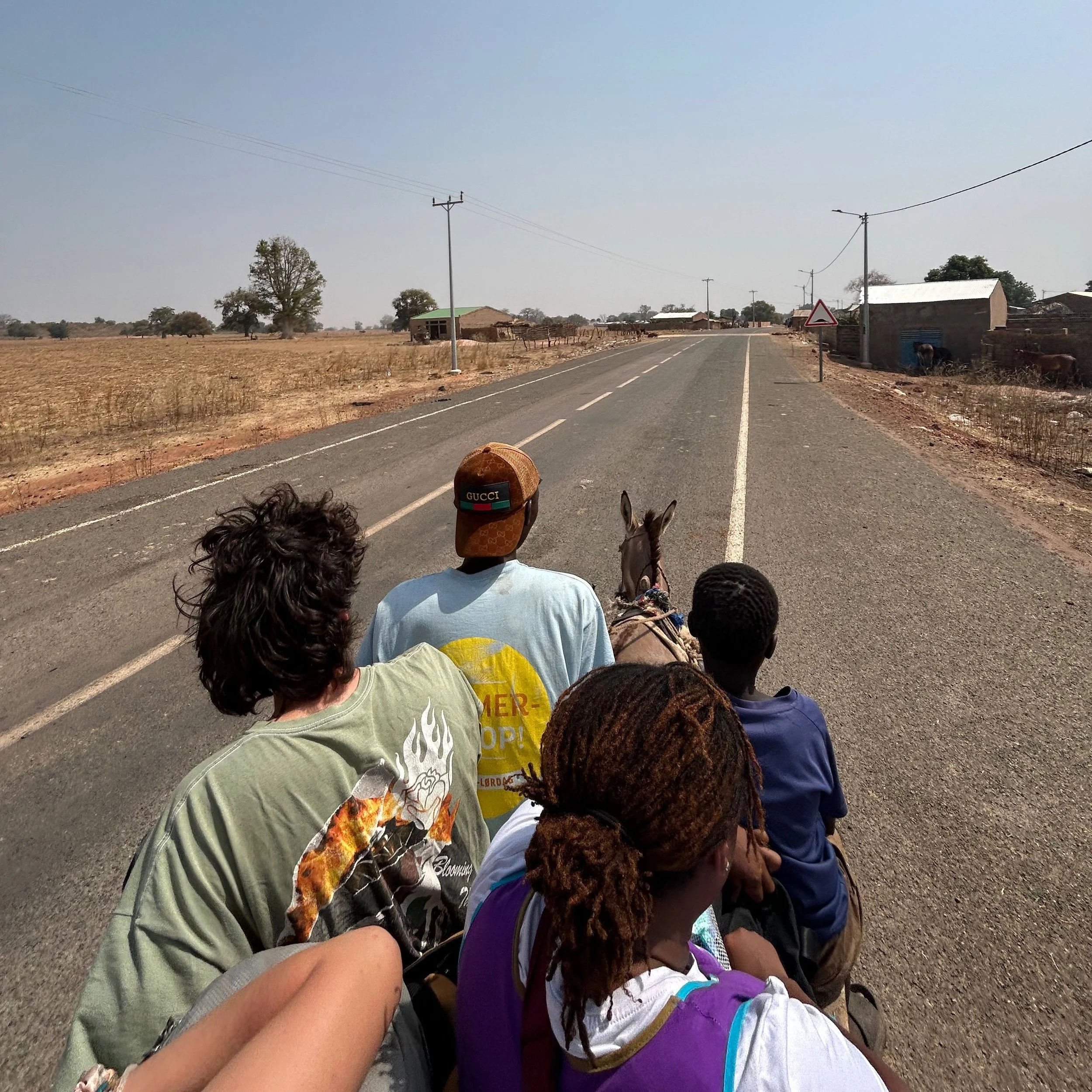How Hitchhiking Across the Sahara Desert Made me a Better Environmental Steward
If you haven’t already heard me talk about it in one form or another (it’s been a very hot topic for my life thus far), I recently spent 6 months solo backpacking across Europe and Africa and wrote a full reflective story on that whole experience. This that I am sharing now is the story of the very end, the last two-ish weeks or so, of that whirlwind of a trip, and how I wrapped it all up with the most epic grand finale, quite possibly ever.
Well, I didn’t initially intend for a monumental ending. But following a whim of spontaneity, the supposed-to-be casual end to my trip turned into something far more transformative - for my spirit, for my career, for my relationships (my testament to the benefits of letting go of stringent planning).
A Moroccan winter
Flashback to this past January, I was gratefully living out the winter months in the most un-winter way imaginable: volunteering for 6 weeks at a dreamy surf camp in the ever-warm and blissful Tamraght, Morocco.
However, as my days volunteering there while progressing on my surf journey began to wane, I became increasingly dissatisfied with the thought of leaving West Africa so soon. A life so refreshingly stripped from the daily productivity stress, days instead spent relishing in good company and bountiful sunshine on the beach… I was not quite ready to part ways with that reality. I mean, who would be?
Conveniently at this time as well, a travel friend I had met back in London, Ben, was also in Morocco and had mentioned his interest in traveling further south down the coast to Senegal & The Gambia.
As I began to ponder and contemplate my next move in this wonderful indulgence called “free will”, I couldn't shake my growing interest in joining his plan.
Me being a surf legend in Morocco (aka only surfing the baby whitewater waves for the first 3 weeks).
Plotting….
Let’s brush up on our geography for a second, shall we? Looking at a map, the main physical barrier standing between our starting point in Morocco and our end destination in Senegal was, you know, only the entire top-to-bottom stretch of the Sahara Desert.
For some context, the Sahara Desert is 3.6 million square miles, making it nearly as large as the United States (the US is 3.8 million square miles). Quite the forbidding obstacle.
So, while executing this plan, we thought through and evaluated all the possible modes of transportation to traverse this mighty desert —> Flights were expensive, buses were minimal, and car rentals were nearly impossible while crossing multiple borders.
None of those seemed satisfactory or even doable, especially for our budget-centered travel style.
But finally, after lots of mulling, researching, and insightful Q&As with some local knowledge, we settled on the most (logical?) and economical option: hitchhiking 2,000 km from Agadir, Morocco, to St Louis, Senegal. Relying on nothing but the goodwill of random passerbyers to carry us through to the end. Dun dun dun…
The vertical Sahara stretch ends basically once you reach the top of Senegal (right below Mauritania), so that was where we ended the hitchhiking.
2,000 km journey: Agadir → Senegal via RN1
Naturally, there were some fears and reservations associated with hitchhiking across nearly lifeless terrain. But the thrill of the experience easily overpowered the fear. I just remember thinking how badass it would be to accomplish this, and then be able to say that we did so successfully. Definitely a “do it for the plot” type of mindset.
However, apart from the obvious badassery congruent with this plan, the journey itself also marked a large turning point in my travels.
During this immersive trek, I truly embraced and fell in love with West African culture, even more than I already had while I was in Morocco. It was a deep cultural exposure I had never really experienced before. One that was heavily reliant on the unceasing selflessness of others, and one stripped away from most usual conveniences, leaving behind days of untainted authenticity.
These authentic, simple days in the desert were with one straightforward mission - make it as far as possible. There are no Hiltons, Marriotts, or Airbnbs along the way. There are no jam-packed, must-do itineraries. We were taken to the most off-the-map types of places, none of which offer the typical “tourist attractions”.
Other people (driving vehicles) are necessary, but are few and far between. While standing out on the barren desert roads, fate entirely surrendered, each vehicle inching closer from a distance became the biggest beacon of hope.
Then the method is highly strategic: Stick a thumb out, try to look as cool and pick-up-able as possible in the finite amount of time it takes the car to drive towards you, and pray, pray, pray. That’s really about all you can do, within your control.
Then, every person who does decide to pick you up becomes a highly cherished interaction, nothing short of a miracle, as every single one of them plays a crucial role in the overall success of the journey. There was also a certain excitement about not ever knowing who would be behind the wheel. (If you want to hear the story of the most legendary man who picked us up, read here!)
It’s raw, vulnerable, challenging, and unpredictable.
But it was an undeniably beautiful and intimate experience. Each day was shaped by openness, trust, human connection, and absorbing every nuance of the culture that lies along and beyond the RN1 road.
Walking across borders
We walked across the border from Morocco into Mauritania, bypassing the long line of cars and trucks that were driving through (perks of going bipedal!). We stayed in the capital city, Nouakchott, for a couple of nights, a city nearly void of any other tourists.
We visited their local fish market, where distinctively colored, hand-painted fishing boats plunge from shore across the crashing waves of the Atlantic Ocean. The fishermen wait for their catches, and then sell those fresh catches in the surrounding market to feed the coastal city and power the local economy.
My friend and I stood silent on the beach for a long time, absorbed in our own mesmerized worlds, watching the scene play out on this unique convergence where desert meets ocean. As if we had reached the corner of the world.
The vastness was humbling.
In Senegal, I was in awe of the bustling, widespread market stalls and aromatic street food. The streets are humming and beating with sellers, shoppers, and everyone in between.
Independent, family-owned vendors don't just sell their food, they have clear pride in it. They rely on the land and subsistence farming to provide them with locally sourced cassava and groundnuts (staple economic crops). Then, they rely on their community to engage and purchase it, building a complete system that is central to their livelihoods.
It's a food-related identity that is deeply ingrained.
And I think that cultural significance is conveyed so ostensibly, it makes the food taste even better.
We relied on these street food varieties for most of our meals, as it was inexpensive with reliably rich flavor.
Plus, it was always an excellent chance to get lost in a conversation with the person running the stand. Often, they would light up, excited to hear where we came from and quick to provide any tips for getting around the surrounding area. They were also always down to teach us some Wolof, the native language, graciously and patiently.
Melting
And finally, when our hitchhiking journey wound down, the cultural integration still played out.
We arrived in Gambia, crossing the border from Senegal via horse (yes, horse), and had the pleasure of a lifetime to stay in a small rural compound with the most hospitable, radiant Gambian family ever.
It was here that my heart truly melted. Possibly due to the unruly Savanna sun, but most likely due to the amount of pure love and genuineness we were surrounded by.
The family so kindly included us in their routine and let us participate in their everyday rituals. We de-shelled large batches of peanuts (that they harvest themselves) with our bare hands, taught a classroom full of the cutest, most excited children ever at the small local school, danced barefoot and played games in the still darkness of the night with the kiddos until bedtime - and it all lifted, twirled, danced, and spun my soul around.
I’ve never been surrounded by such a genuine embrace of togetherness.
So many times, we were graciously ushered into spaces where people made time for us, went out of their way to help us, accommodate us, or include us. It happened so frequently that we quickly realized this type of inclusion is a natural inclination of their culture, an embedded way of living.
I love this picture, the guys standing on top of the bus, so casually, as if having some typical team deliberation.
Making space
2 weeks. We only hitchhiked and lived this extended adventure for 2 weeks, and within those 2 weeks, we got picked up by countless generous people, learned a bit of Arabic and Wolof along the way, saw progression in our communication with locals, and fully became one with the almighty desert.
Within those two weeks, I felt more connected to nature, to people, and to the simple essence of being than I ever have.
I’ve long had a penchant for sustainability, along with a lengthy background in environmental science education, but this experience awakened a new invigoration, cementing within me a deeper commitment to environmental stewardship.
If I had to pinpoint exactly how, I’d say it has a lot to do with the art of simplicity. A cliche, yes, but powerfully underrated.
There’s so much power in silencing the constant, nagging background voices and worries that often come with extreme hustle, phone dependence, and flashy, in-your-face advertisements and algorithms (also rarely had any cell service during this journey, a true blessing sometimes).
Once decluttered, I believe there's more room in the mind to create space for the things that make us feel whole, that make us feel connected, that ignite that beautiful force of empathy and a true desire to learn from everything happening around us.
Getting a ride into the Gambian village via donkey!
Caring collectively
My head cleared, and my feet grounded in the African desert sands, I tried to absorb all the realities around me. I recognized how abundant life can be, without the so-called status quo “abundances” we often strive for in our highly consumptive Western culture.
And in my environmentalist mind, I know that these precious lives, who rely on their precious arable land and fertile agriculture and abundant fisheries and healthy coastlines… may not always be given the security they need.
For all of the known climate change reasons and consequences, I am sure (I hope) we are all well aware of them by now. Rising temperatures and sea levels are altering ecosystems, increasing drought is causing water and food scarcity, and communities are being displaced. All of these are a part of the unforgiving consequences that come from the mass mistreatment of our planet.
Africa as a continent contributes only about 2-3% of total global carbon emissions, yet it is one of the most vulnerable regions in the world to the life-threatening effects of climate change.
And this isn’t new news to me. I remember hearing similar stats throughout my years in school, and knowing that there exists a disproportionate effect. But something funny happens when you see a situation first-hand.. You believe it, and better yet, feel it! Words are just words preached at you about events in location B while you are safe and comfortable in location A. The resonance of impact doesn’t always land when it has to travel that far, unfortunately.
This is why traveling is such a gift! Immersion is the most effective way to learn, cultivate empathy, and foster cultural connection. Which, for me, has made me want to be a better environmental steward.
It is also a hook that never gets old to use: “I hitchhiked across the Sahara Desert”. You can absolutely believe that’ll be on my gravestone.
However, if it weren't for this crazy adventure, I probably wouldn't have had such a transformative experience, or the opportunity to come face-to-face with these places and people, and have gained such a deep appreciation for the most authentic, inspiring parts of their cultures.
Now, as I'm back in the US, months later, I stand more firmly than ever in the vocation of “environmental steward”, but with deeper personal conviction.
I feel more conscious, more connected, and more inspired to live out every day with that vocation in mind.
What simple things can I do today to live those values out?
Maybe I choose not to eat meat one day. Maybe I refrain from buying that one trendy Amazon product I impulsively clicked on from a sneaky ad funnel. Maybe I make conscious goals for myself to consume less overall.
Maybe I just read and stay informed on current events a bit more each day. Maybe I just stay as mindful as possible and as caring as possible each day.
And then I can't help but think that if we could all just slow the heck down and truly tend to the relationships we create with people and the earth, we’d all care a bit more too.
I am an environmental steward, and I think everyone should be too.
Thanks for reading xoxo!!





